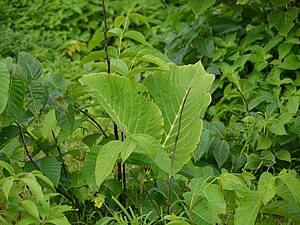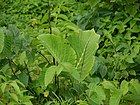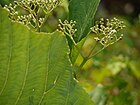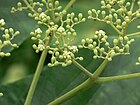Note: This is a project under development. The articles on this wiki are just being initiated and broadly incomplete. You can Help creating new pages.
Difference between revisions of "Leea macrophylla - Hastikarna"
(Created page with "{{stub}} Category:Herbs") |
|||
| (20 intermediate revisions by 2 users not shown) | |||
| Line 1: | Line 1: | ||
| − | {{ | + | [[File:Large-leaved Leea (3871236586).jpg|thumb|right]] |
| + | '''Leea macrophylla''' is a perennial plant with stems that becomes more or less woody. The plant is often shrub-like and occasionally tree-like, growing from a tuberous rootstock. | ||
| + | The plant is harvested from the wild for local use as a food, medicine and dye, It is planted in Sri Lanka for its medicinal use and may well also be cultivated in Malesia. | ||
| + | ==Uses== | ||
| + | {{Uses|Sexual debility}}, {{Uses|Guineaworm}}, {{Uses|Ringworm}}, {{Uses|Cancer}}. | ||
| + | ===Food=== | ||
| + | Leea macrophylla can be used in Food. Leaves are cooked as vegetable and mature fruits are eaten raw.<ref name="Forest foods of Western Ghat"/> | ||
| + | ==Parts Used== | ||
| + | {{Parts Used|Leaves}}, {{Parts Used|Fruits}}. | ||
| + | ==Chemical Composition== | ||
| + | The leaves contain an abundance of of phenolic constituents such as flavonoids, leucoanthocyanidins, p-hydroxybenzoic acid, syringic acid and gallic acid.<ref name="chemical composition"/> | ||
| + | |||
| + | ==Common names== | ||
| + | {{Common names|sa=Samudrika|en=Hathikana|hi=Hathikana|mr=Gajakarni}} | ||
| + | |||
| + | ==Properties== | ||
| + | Reference: Dravya - Substance, Rasa - Taste, Guna - Qualities, Veerya - Potency, Vipaka - Post-digesion effect, Karma - Pharmacological activity, Prabhava - Therepeutics. | ||
| + | ===Dravya=== | ||
| + | ===Rasa=== | ||
| + | |||
| + | ===Guna=== | ||
| + | |||
| + | ===Veerya=== | ||
| + | |||
| + | ===Vipaka=== | ||
| + | |||
| + | ===Karma=== | ||
| + | |||
| + | ===Prabhava=== | ||
| + | |||
| + | ===Nutritional components=== | ||
| + | Leea macrophylla Contains the Following nutritional components like - Vitamin-C and E; Calcium, Copper, Iron, Magnesium, Manganese, Phosphorus, Potassium, Sodium, Zinc<ref name="Forest foods of Western Ghat"/> | ||
| + | |||
| + | ==Habit== | ||
| + | {{Habit|Shrub}} | ||
| + | |||
| + | ==Identification== | ||
| + | ===Leaf=== | ||
| + | {{Leaf|||}}<ref name="Leaf"/> | ||
| + | |||
| + | ===Flower=== | ||
| + | {{Flower||||}} | ||
| + | |||
| + | ===Fruit=== | ||
| + | {{Fruit||||||}} | ||
| + | |||
| + | ===Other features=== | ||
| + | |||
| + | ==List of Ayurvedic medicine in which the herb is used== | ||
| + | |||
| + | ==Where to get the saplings== | ||
| + | |||
| + | ==Mode of Propagation== | ||
| + | {{Propagation|Seeds}}, {{Propagation|Air layering}}, {{Propagation|Cuttings}}. | ||
| + | |||
| + | ==How to plant/cultivate== | ||
| + | Species in this genus generally succeed in full or partial sun, preferring a moist, fertile, well-drained soil<ref name="How to plant/cultivate"/>. Leea macrophylla is available through July to October<ref name="Forest foods of Western Ghat"/>. | ||
| + | |||
| + | ==Commonly seen growing in areas== | ||
| + | {{Commonly seen|Open vegetation}}, {{Commonly seen|Dry forest}}. | ||
| + | |||
| + | ==Photo Gallery== | ||
| + | <gallery class="left" caption="" widths="140px" heights="140px"> | ||
| + | Large-leaved Leea (3871236586).jpg | ||
| + | Large-leaved Leea (3958444386).jpg | ||
| + | Leea macrophylla (1505262375).jpg | ||
| + | Leea macrophylla at Queen Sirikit Botanic Garden - Chiang Mai 2013 2600.jpg | ||
| + | </gallery> | ||
| + | |||
| + | ==References== | ||
| + | <references> | ||
| + | <ref name="chemical composition">[https://www.hindawi.com/journals/bmri/2015/356729/ Chemistry]</ref> | ||
| + | <ref name="Leaf">[Morphology]</ref> | ||
| + | <ref name="How to plant/cultivate">[http://tropical.theferns.info/viewtropical.php?id=Leea+macrophylla Cultivation]</ref> | ||
| + | <ref name="Forest foods of Western Ghat">"Forest food for Northern region of Western Ghats" by Dr. Mandar N. Datar and Dr. Anuradha S. Upadhye, Page No.104, Published by Maharashtra Association for the Cultivation of Science (MACS) Agharkar Research Institute, Gopal Ganesh Agarkar Road, Pune</ref> | ||
| + | </references> | ||
| + | |||
| + | ==External Links== | ||
| + | * [http://tropical.theferns.info/viewtropical.php?id=Leea+macrophylla Leea macrophylla roxb on the ferns.info] | ||
| + | * [https://indiabiodiversity.org/species/show/230203 Leea macrophylla roxb on india biodiversity.org] | ||
| + | * [https://herbs.indianmedicinalplants.info/index.php/sanskrit-names-of-plants/46-2012-03-14-06-45-13/487-leea-macrophylla Leea macrophylla roxb on indian medicinal plants.info] | ||
[[Category:Herbs]] | [[Category:Herbs]] | ||
| + | [[Category:Vitaceae]] | ||
Latest revision as of 11:30, 12 November 2021
Leea macrophylla is a perennial plant with stems that becomes more or less woody. The plant is often shrub-like and occasionally tree-like, growing from a tuberous rootstock. The plant is harvested from the wild for local use as a food, medicine and dye, It is planted in Sri Lanka for its medicinal use and may well also be cultivated in Malesia.
Contents
- 1 Uses
- 2 Parts Used
- 3 Chemical Composition
- 4 Common names
- 5 Properties
- 6 Habit
- 7 Identification
- 8 List of Ayurvedic medicine in which the herb is used
- 9 Where to get the saplings
- 10 Mode of Propagation
- 11 How to plant/cultivate
- 12 Commonly seen growing in areas
- 13 Photo Gallery
- 14 References
- 15 External Links
Uses
Sexual debility, Guineaworm, Ringworm, Cancer.
Food
Leea macrophylla can be used in Food. Leaves are cooked as vegetable and mature fruits are eaten raw.[1]
Parts Used
Chemical Composition
The leaves contain an abundance of of phenolic constituents such as flavonoids, leucoanthocyanidins, p-hydroxybenzoic acid, syringic acid and gallic acid.[2]
Common names
| Language | Common name |
|---|---|
| Kannada | NA |
| Hindi | Hathikana |
| Malayalam | NA |
| Tamil | NA |
| Telugu | NA |
| Marathi | Gajakarni |
| Gujarathi | NA |
| Punjabi | NA |
| Kashmiri | NA |
| Sanskrit | Samudrika |
| English | Hathikana |
Properties
Reference: Dravya - Substance, Rasa - Taste, Guna - Qualities, Veerya - Potency, Vipaka - Post-digesion effect, Karma - Pharmacological activity, Prabhava - Therepeutics.
Dravya
Rasa
Guna
Veerya
Vipaka
Karma
Prabhava
Nutritional components
Leea macrophylla Contains the Following nutritional components like - Vitamin-C and E; Calcium, Copper, Iron, Magnesium, Manganese, Phosphorus, Potassium, Sodium, Zinc[1]
Habit
Identification
Leaf
| Kind | Shape | Feature |
|---|---|---|
Flower
| Type | Size | Color and composition | Stamen | More information |
|---|---|---|---|---|
| {{{5}}} |
Fruit
| Type | Size | Mass | Appearance | Seeds | More information |
|---|---|---|---|---|---|
Other features
List of Ayurvedic medicine in which the herb is used
Where to get the saplings
Mode of Propagation
Seeds, Air layering, Cuttings.
How to plant/cultivate
Species in this genus generally succeed in full or partial sun, preferring a moist, fertile, well-drained soil[4]. Leea macrophylla is available through July to October[1].
Commonly seen growing in areas
Photo Gallery
References
- ↑ 1.0 1.1 1.2 "Forest food for Northern region of Western Ghats" by Dr. Mandar N. Datar and Dr. Anuradha S. Upadhye, Page No.104, Published by Maharashtra Association for the Cultivation of Science (MACS) Agharkar Research Institute, Gopal Ganesh Agarkar Road, Pune
- ↑ Chemistry
- ↑ [Morphology]
- ↑ Cultivation
External Links
- Ayurvedic Herbs known to be helpful to treat Sexual debility
- Ayurvedic Herbs known to be helpful to treat Guineaworm
- Ayurvedic Herbs known to be helpful to treat Ringworm
- Ayurvedic Herbs known to be helpful to treat Cancer
- Herbs with Leaves used in medicine
- Herbs with Fruits used in medicine
- Herbs with common name in Hindi
- Herbs with common name in Marathi
- Herbs with common name in Sanskrit
- Herbs with common name in English
- Habit - Shrub
- Index of Plants which can be propagated by Seeds
- Index of Plants which can be propagated by Air layering
- Index of Plants which can be propagated by Cuttings
- Herbs that are commonly seen in the region of Open vegetation
- Herbs that are commonly seen in the region of Dry forest
- Herbs
- Vitaceae




